Driving your Mercedes-Benz GLS in warmer temperatures with a malfunctioning air conditioning system can quickly become a nuisance when sweltering heat builds up in the cabin. There are several causes for AC not blowing cold air in GLS, which we will go through in this article.

The most common causes for AC not cooling properly in Mercedes-Benz GLS are low or overcharged refrigerant, compressor malfunction, clogged cabin air filter, dirty condenser or evaporator coils, dirty or sluggish blower motor, and bad fuse or relay. Less common causes are clogged expansion valve or orifice tube, overcharged oil, faulty blend door actuator, or a defect in the climate control unit.
1. Low refrigerant
Insufficient amount of refrigerant in the AC system is one of the leading causes of AC not blowing cold air in GLS. This can happen due to a leak or if the AC has not been recharged for a long time.
Refrigerant leak
A low refrigerant level in your GLS does not necessarily mean there is a leak. Ideally, the refrigerant should never leak in a properly sealed AC system, but most car AC systems do leak small amount of refrigerant over time due to minor imperfections and will need recharging after every few years.
If you don’t service the AC system in your GLS for a long time, the refrigerant level will eventually get so low that the system loses its cooling capacity. Just have it refilled and you can drive with pleasant temperatures again. If the refrigerant level goes down again quickly, it means there is probably a leak.
Refrigerant leak causes
Refrigerant leak in GLS can be caused by leaking O-ring seals, leaking condenser or evaporator core, or a cracked hose. The leak can be diagnosed by injecting small amount of fluorescent dye into the AC system. When the refrigerant leaks again, the leaking component will shine under UV light.
How to recharge AC refrigerant in Mercedes-Benz GLS
There are two ports in the air conditioning system of GLS. One is labelled H for high-pressure and the other one is labelled L for low-pressure. You can recharge your AC through the low-pressure port with a do it yourself AC recharge kit.
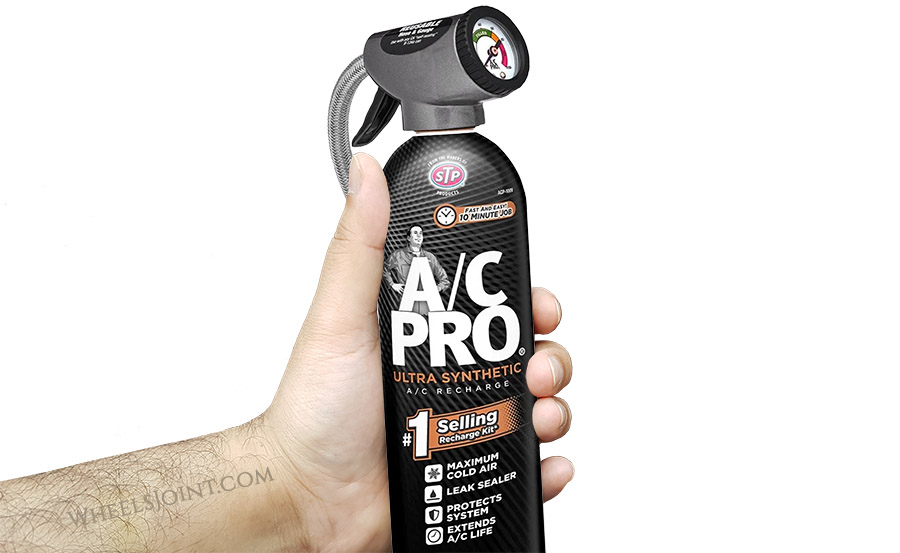
- Open the hood of your GLS.
- Check which type of refrigerant your vehicle uses. This information is typically located under the hood and/or in the owners manual.
- Start the engine.
- Turn on the AC and set it to the coldest setting, and the fan speed to maximum.
- Remove the cap from the low pressure service port labelled L, and connect the AC recharge kit.

Note: If the ports are not labelled, try connecting the recharge kit to both unlabeled ports on the AC hoses. The recharge kit will only properly connect to the low pressure port, and will not fit the high pressure port. - Shake the canister briefly and release the refrigerant into the system until the recommended pressure has been achieved.
Note: See next section for recommended pressure values.
Recommended video
Warning: Wear gloves and safety glasses before recharging the AC to avoid accidental exposure to harmful chemicals in the refrigerant. It is also cryogenic and can cause severe frostbite when it comes in contact with the skin.
2. Overcharged refrigerant
Just like with low refrigerant, the AC in GLS will blow warm air only if the AC system is overcharged with refrigerant. An overcharged system not only affects cooling performance but can also damage the compressor and sometimes can cause a major leak.
Ambient temperature affect on refrigerant pressure
The refrigerant pressure is affected by the outside atmospheric temperature. So, even if you recharged your GLS AC at the recommended pressure, the system could still over pressurize when the ambient temperatures get warmer.
Most modern vehicles use R-134a refrigerant, but newer vehicles are increasingly using R-1234yf as a more environmentally friendly replacement. The pressure values based on ambient temperatures differ depending on the type of the refrigerant. Check your vehicle’s owners manual or look under the hood to find the type of the refrigerant your vehicle uses.
Low side pressure values R134a vs R1234yf
| Ambient Temperature | R-134a | R-1234yf |
| 70°F (21°C) | 35-40 psi | 20-30 psi |
| 80°F (27°C) | 40-50 psi | 25-35 psi |
| 90°F (32°C) | 45-55 psi | 30-40 psi |
| 100°F (38°C) | 45-55 psi | 35-45 psi |
| 110 °F (43°C) | 45-55 psi | 40-50 psi |
Check refrigerant pressure
Connect the pressure gauge to the low pressure (L) port in GLS. If the pressure is higher than the recommended pressure, let some refrigerant out preferably into a rag to avoid exposure.
3. Clogged cabin air filter
The pollen filter, also known as the cabin air filter or microfilter, is responsible for filtering the air that the passengers breathe in Mercedes-Benz GLS. A dirty filter causes the overall ventilation of the interior to deteriorate resulting in reduced cooling and air flow. It also puts unnecessary strain on the entire AC system which negatively impacts the fuel consumption.
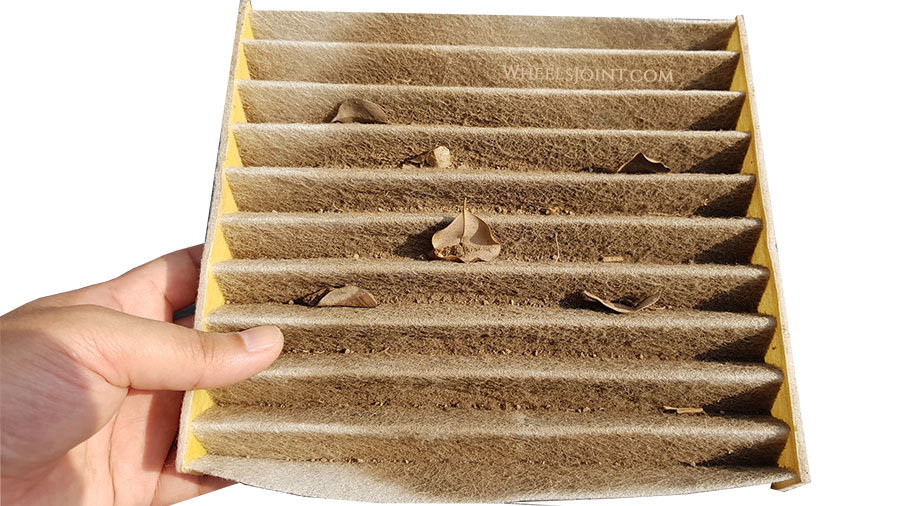
There is no prescribed time for changing cabin air filter, but most manufacturers recommend a change after 10,000-20,000 miles. If you drive your vehicle in dusty or polluted environment, the filter can get dirty much sooner than manufacturer’s recommendation.
Can you clean a dirty cabin air filter?
Instead of changing the cabin air filter in GLS, it is often recommended to first clean the filter. This can be done, for example, with a vacuum cleaner or a compressed air system, removing at least a large part of the visible dirt particles. Unfortunately, this procedure does not allow you to get into the deeper layers of the filter. Therefore, the filter performance will not increase significantly even after cleaning. As a rule, there is no avoiding a change if the filter is dirty.
Recommended video
Note: Dirty cabin air filter mostly only leads to reduced cooling. If only hot air comes out of the air vents in your GLS, then the problem probably lies somewhere else.
4. Dirty condenser
The air conditioning system in Mercedes-Benz GLS has a condenser coil that sits at the front of the vehicle, and is responsible for releasing the heat from the refrigerant into the ambient air. Over time, grime, bugs and other small particles can build up on its surface and in the gaps of its mesh. This hinders the condenser’s ability to release heat as less air passes through the mesh, which results in poor cooling in the cabin.
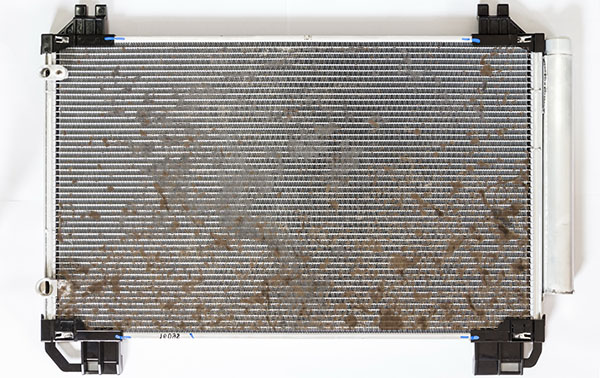
Clean the condenser
If the condenser is dirty on your GLS, the simplest solution is to clean it. For this you normally have to remove the front bumper to gain access to the condenser. You can use pressure washer for cleaning, but make sure its at low pressure setting, as high pressure can damage the delicate fins on the condenser.
5. Dirty evaporator
Dirty evaporator can also significantly reduce AC cooling performance in GLS. The cabin air filter captures most of the dirt or other airborne particles, but some particles escape and can get lodged on to the evaporator. Over time, these particles build up on the fins and block the air flow through the evaporator, causing reduced air flow in the cabin and poor cooling.
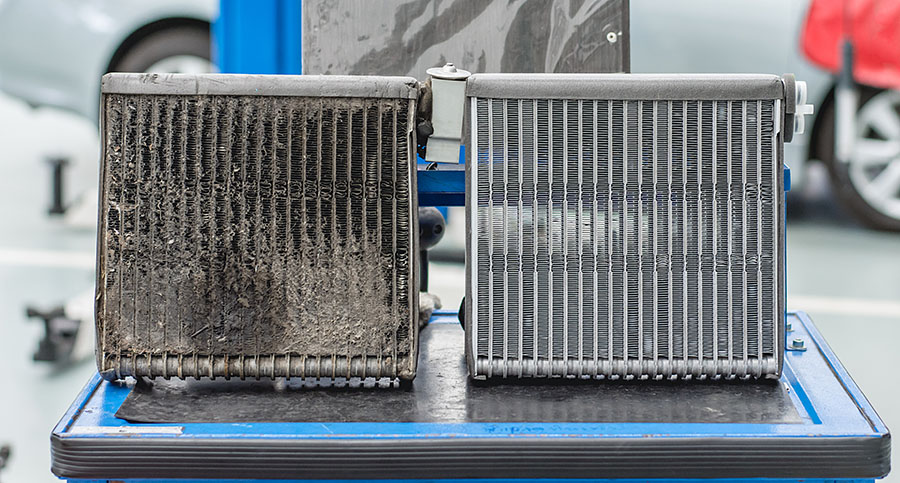
Symptoms of a dirty evaporator
The two most prominent symptoms of a clogged up evaporator in GLS are: the air flow from the AC vents is choppy and not smooth, and the inside of the vehicle is developing a bad moldy smell.
Clean the evaporator
Cleaning the evaporator in GLS is not a simple task. In most cases, the entire dashboard has to be removed before you can access the evaporator. Therefore, it is recommended to do this in a workshop.
6. Faulty compressor
The compressor is the heart of the air conditioning system in Mercedes-Benz GLS. It is not only responsible for pumping the refrigerant throughout the AC system but also converting the refrigerant from gaseous state to liquid state as it passes through the condenser. If the compressor fails, the AC will only blow warm air.

Causes of compressor failure
Insufficient lubricant: The compressor in GLS needs lubrication to function properly and minimize mechanical wear by reducing friction. If there isn’t enough oil added with the refrigerant or to the compressor itself if it was replaced, the internal components of the compressor will wear out and cease to function.
Too much oil: If there is excessive amount of oil added with the refrigerant, it can cause compressor performance issues which reduces cooling efficiency, and can also cause premature compressor failure.
Keep in mind, an AC compressor can fail without any apparent cause, especially in older vehicles or in vehicles that have racked up too many miles. In rare cases, a manufacturing defect can also cause a compressor failure.
7. Overcharged oil
If you are only topping off the refrigerant in your Mercedes-Benz GLS with off-the-shelf refrigerant recharge cans and not repairing the leak, you may have flooded with AC system with oil since these cans often contains added oil.
The excess oil may pool in various places of the AC system and can coat the inner walls of the evaporator and condenser, diminishing their ability to absorb or dissipate heat, consequently reducing the overall cooling performance. Excessive oil can also reduce the performance of the compressor and can cause it to fail prematurely.
8. Clogged expansion valve or orifice tube
Your vehicle’s air conditioning system has an expansion vale or an orifice tube, depending on the model. The function of both expansion valve and orifice tube is the same, to restrict the flow and reduce pressure of the refrigerant before it enters the evaporator coil. Both of these are at risk of clogging due to contamination, for example due to metal shavings from a failing compressor.

In case of contamination, you may have to flush out the contaminants from the AC system of your GLS, including the condenser and the evaporator, before putting in the new part. In case of severe contamination, multiple components may have to be replaced, including the condenser, the evaporator and the compressor.
9. Dirty blower motor
The blower motor is the central component of the air conditioning system in GLS, responsible for blowing cold air through the AC vents. Although most of the dirt and other particles in the air are filtered by the cabin air filter, but some particles do escape and can cling to the fins of the blower cage. Over time dust can accumulate on the fins and reduce the air flow, which reduces cooling performance.
If too much dirt is caked in the blower fins, it can throw off the balance of the spinning cage and cause it to wobble. This puts strain on the motor and further reduces the air flow and cooling performance, and may also cause unusual noises from behind the dashboard.
Clean the blower motor
Remove the blower motor, typically located under the passenger side dashboard, and inspect the condition of the cage. If found dirty, clean it using a brush.
Recommended video
10. Sluggish blower motor
If the blower motor in your GLS is not spinning fast enough either due to an internal defect or due to a fault in the resistor/control module, the AC cooling performance will be degraded due to reduced air flow.
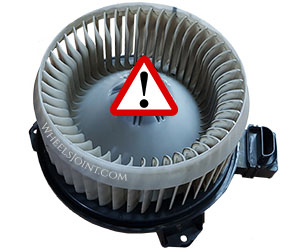
When a blower motor goes bad, it usually makes unusual noises when in operation, and the passengers may feel reduced air flow from the AC vents. Keep in mind that reduced air flow doesn’t always indicate a problem with the blower motor, as it can also happen due to a clogged cabin air filter, dirty evaporator, or a bad mode door actuator. So, all of them must be inspected when diagnosing poor air flow.
11. Faulty blend door actuator
Blend door actuator plays a role in controlling the temperature inside your GLS. If there is a problem with the temperature of the air conditioning system, it could be due to a bad blend door actuator.
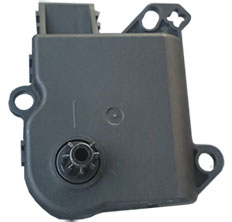
The most common symptom of a faulty blend door actuator in Mercedes-Benz GLS is a slight clicking sound (or other unusual noise) repeatedly coming from under the dashboard. The sound will be most prominent for a few seconds when you turn on the air conditioning or adjust the temperature.
Symptom: knocking sound
A knocking noise from behind the dashboard could be an indicator of a bad blend door actuator in your GLS. The sound is something like a light tapping on the door and it typically happens when you turn on/off the air conditioning system or start the engine.
Symptom: creaking sound
One side hot, other side cold
A common symptom of a faulty blend door actuator in vehicles with dual zone climate control system is one side blowing hot air while the other side is blowing cold air.
Replace the faulty part
A bad blend door actuator cannot be repaired and must be replaced with a new one. Due to the complexity of the replacement job, it is not recommended as a DIY project. The blend door actuator may require recalibration after replacement.
12. Blown fuse or bad relay
Check all the relevant fuses and relays related to the air-conditioning system in your GLS. Check the owners manual of your vehicle or the fuse box cover to find the exact location of the AC fuses. If the fuse is blown, replace it with a new one with the specified amp rating.
13. Bad climate control unit
Climate control module is the brain of the air-conditioning system in your Mercedes-Benz GLS, responsible for controlling all the components in the system. In rare cases, a fault in the climate control unit can cause the AC to stop cooling.
Use OBD2 scanner for diagnosis
Since Mercedes-Benz GLS is equipped with on-board diagnostics (OBD), a fault diagnosis can provide initial indications of where the malfunction is located in the air conditioning system.
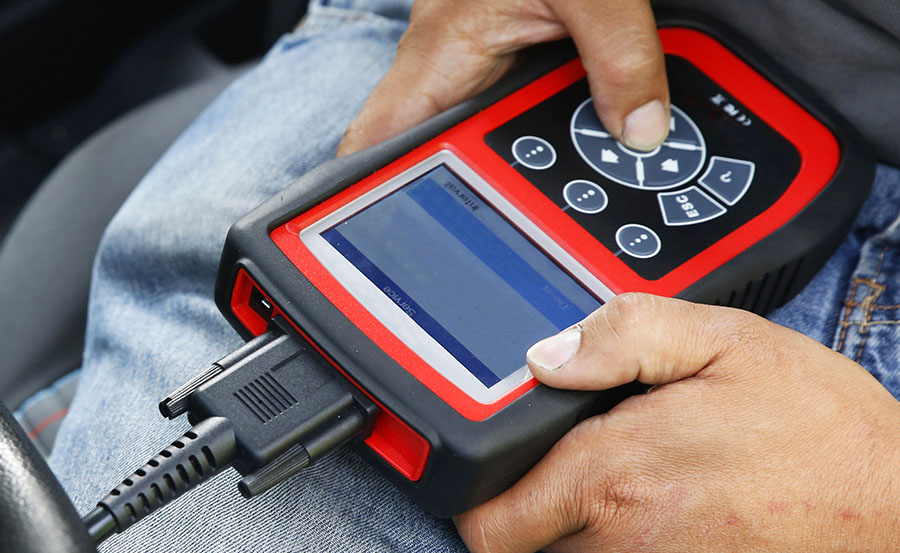
To begin troubleshooting, you must first connect the diagnostic tool to your GLS. The OBDII connector is usually located under the dashboard. With the tool connected, turn on the ignition. Most diagnostic devices then ask for some information about the vehicle. It is important that you enter this 100% correctly, otherwise the result of the search may be inaccurate. In addition to the vehicle make, model, and engine type, you usually also have to type in the Vehicle Identification Number (VIN). Since some OBD codes are manufacturer-specific, the scanner will be able to give you more accurate information if you enter more details about your GLS.
Conclusion
There are many reasons why your Mercedes-Benz GLS AC is not cooling properly. When looking for the reason, you should always start with the most obvious cause, insufficient amount of refrigerant.
In any case, it is advisable for laypersons to visit a workshop. A professional mechanic can swiftly diagnose the poor AC cooling issue for you.


